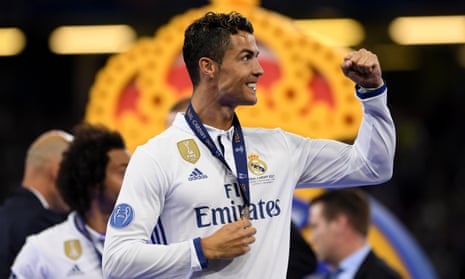Just when you thought it might be all about the man it’s never about, it was about the man it’s always about. In the buildup to this final, Casemiro had insisted that he’s there to “plug holes”, claiming that it is robbing the ball, not scoring goals, that brings him pleasure, and yet he had just reached a higher plane, thumping in the shot that put Real Madrid back into the lead and looked set to bring the night in Cardiff to a close. Three minutes later, though, another man stepped centre-stage. Him, again. Cristiano Ronaldo dos Santos Aveiro.
Never write him off, never say it’s over. Don’t even laugh when he says he wants to play beyond 40; listen instead. He decides when it ends. This season, more than any other season, well past 30, he has decided how it ends too. In Cardiff, it ended in a way it has not for 59 years: with Real Madrid champions of Spain and Europe. Although Marco Asensio added a late fourth, Ronaldo’s second was the moment Madrid knew they were the first team to defend the Champions League.
As Luka Modric went up the right just after the hour, Ronaldo dashed towards the near post and, when the ball came to him, he steered it first time past Gianluigi Buffon. Ronaldo kept running, heading towards the same corner Casemiro had occupied just moments before, with the fans chanting: “This is how Real Madrid win.” Recently, it has been too, more than ever before. Ronaldo had opened the scoring; now he had the second, taking him to 12, one for each European Cup Madrid have won, and making him the first player to score in three finals. It also made him the competition’s top scorer for the sixth time.
That was appropriate, and yet for so long it had appeared impossible. Some even wondered if it would ever be possible again. How foolish we were. Unknown to most, something had already happened to seek continuity. In August, Zinedine Zidane spoke to Ronaldo. The moment was perfect, two elements contributing: Ronaldo had just become a European champion with Portugal and he was injured. For each of the last three seasons, he had struggled towards the finish line, which was something that his coach wanted to avoid. Zidane had devised a plan; now he presented it. Here at the Millennium Stadium, that plan came together.
Zidane convinced Ronaldo that there had to be more rest, more rotation, protecting him so that he could peak in the most important games. It would also allow the 32-year-old to prolong his career. Ronaldo had to take a step back occasionally and as the months passed the process was accelerated. Of Madrid’s final seven away games in the league, Ronaldo sat out four. It worked. At full time here, he was named man of the match, a European Cup winner for the third time with Madrid. He had been the image of the last two finals, sure, but not in truth decisive, as he was here.
“We’ve been intelligent,” Ronaldo would say. “I have been saving myself: it is these games when titles are decided.” When he played, he decided. He had just two goals in the competition, none since the autumn, when Madrid headed into the quarter-final against Bayern Munich. By the time he arrived here, he was on 10. He left with two more and another trophy. Two hat-tricks and eight goals were scored across four games against the Germans and then Atlético, two more against Juventus. He also scored the goal that clinched Madrid’s first league title in five years, with his sixth in the final four games.
Ronaldo has evolved, becoming more of a No9, a striker whose movement is more honed. With every passing year, the stats confirm the sensations: he is dribbling less, covering less distance. But he is astute and deadly: this season he has taken fewer shots for each goal than ever before. The opener here was an example: once, the striker might have slipped the ball wide for him to burst into the area; this time, he was the striker, slipping it wide and showing for the return. Carvajal’s cutback was hit, like so many of Ronaldo’s goals, first time.
He leapt and drew down his arms, as he does – a celebration seen often, copied by five-year-olds everywhere. One that was destined to be repeated when he got his second. Like the first, it was turned in first time. Another night, another final, another goal. More astonishing, more impressive, even than those previous nights. His best of all at the end of a career that was already barely believable. More records falling: the first player to reach 100 goals in the Champions League was the competition’s top scorer for a record sixth time.
This was different, though. Different and better. This is Ronaldo’s worst goalscoring season in seven years. The thing is, his worst is pretty much everyone else’s best – over the last six seasons he scored 51, 61, 51, 55, 60 and 53 goals, while this was only his 41st – and then there’s the fact that his year has quality over quantity. It is not simply how many goals Ronaldo scores that matters, although there are many of them, it is which goals. Bayern, Atlético, Juventus. Quarters, semis, final. It might have felt like his moment had gone but when the moment arrived so did he. Him again.

